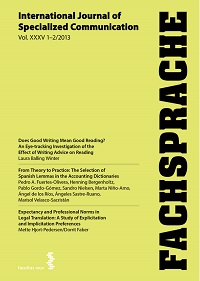Expectancy and Professional Norms in Legal Translation: A Study of Explicitation and Implicitation Preferences
##plugins.themes.bootstrap3.article.main##
##plugins.themes.bootstrap3.article.sidebar##
Abstract
This article reports on the findings of a qualitative study seeking to generate hypotheses about norms as psycho-social entities amongst professional producers and commissioners of
legal translations, and to shed light on the reasons underlying these norms. In particular, we wish to investigate how perceived norms influence the use of explicitation and implicitation. The findings are based on experiments involving Danish translators and legal experts who were asked to evaluate three different translations into English of the same Danish legal source text on a set of defined parameters. These parameters focus on the degree to which the use of explicitation and implicitation is considered to influence meaning transfer, authentic English legal language and style, and the informative function of the translation in a defined translational situation. Based on Chesterman’s categorization of norms into expectancy and professional norms, the study leads us to set up two assumptions about the existence of norms at the macro-strategic level that may impact on attitudes across members of different discourse communities within the legal domain. These norms, we believe, may be useful in legal translation training to heighten student translators’ awareness that norms are not a uniform entity, but subject to different perceptions depending on discourse community membership.
Zitationsvorschlag
##plugins.themes.bootstrap3.article.details##
translation theory, legal translation, fidelity, norms, asymmetry hypothesis, explication and implication, legal translators and legal experts

